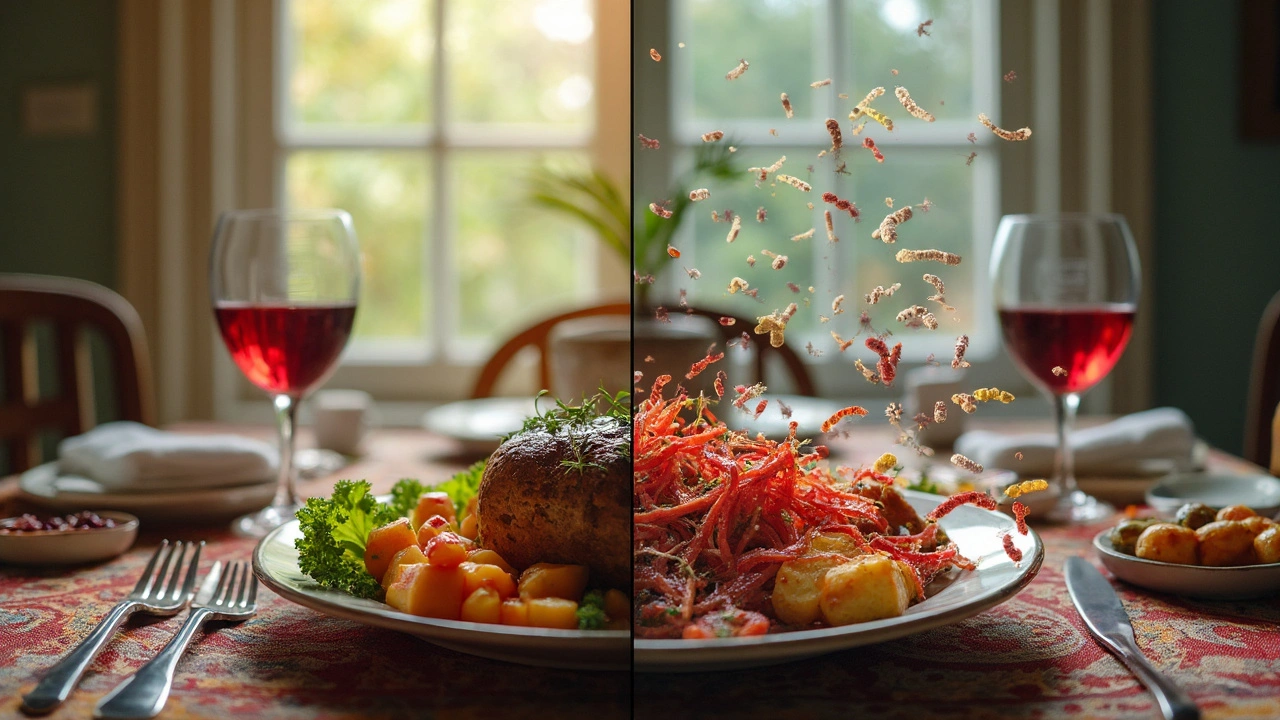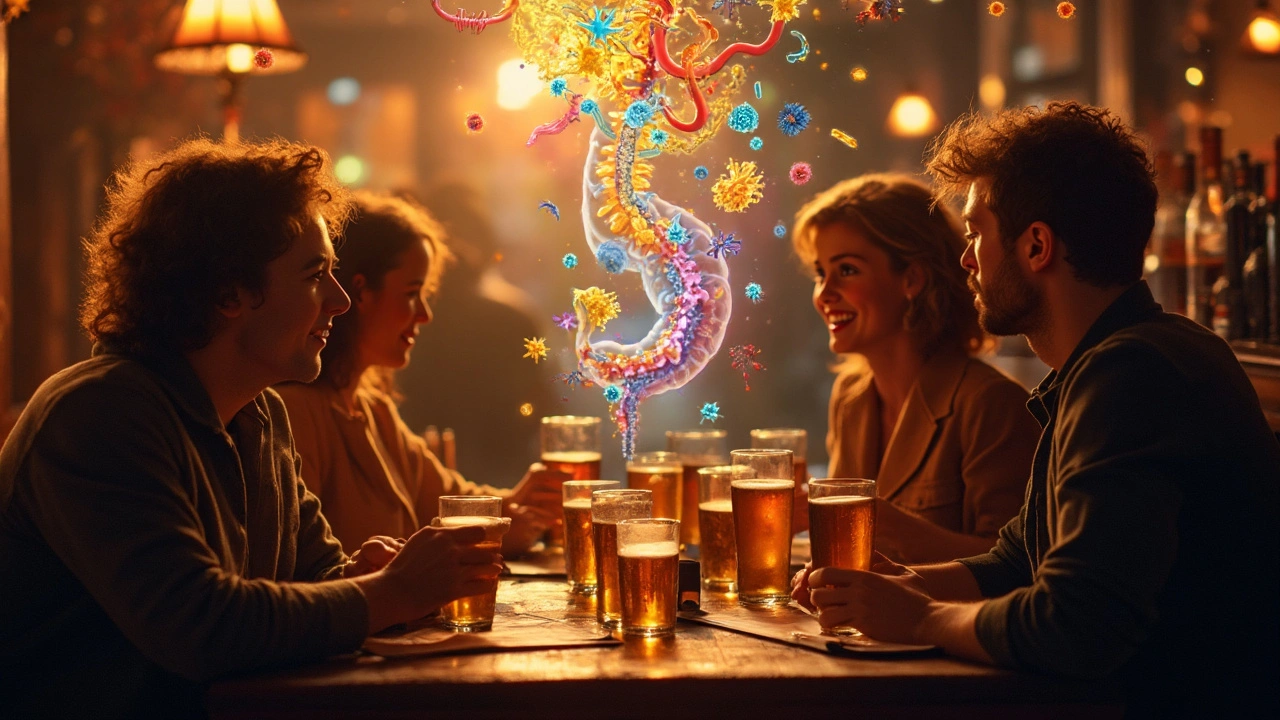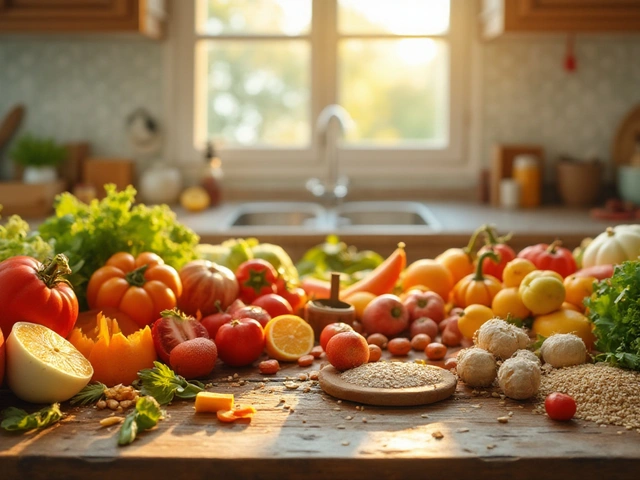Here's something almost no one tells you before your first pint: your gut has an army of microbes living inside it, and a single wild weekend can throw that army straight into chaos. You probably sip a gin and tonic after work, have a glass (or three) of shiraz at dinner, and enjoy a beer at the pub. But, what does this routine actually do to the bacteria that quietly keep your body running? A lot more than you’d think—and not in a good way.
Why Your Gut Microbiome Matters More Than You Realize
Your gut isn't just some food-processing tube. Inside your lower belly, trillions of bacteria and other tiny organisms carry out missions you wouldn't want to handle yourself. They help you break down what you eat, create vitamins, control your appetite, and even talk to your brain. Think of your gut like Perth’s CBD at lunchtime: busy, buzzing, and everyone has a job. But start flooding the streets with toxic waste—like alcohol—and sooner or later, havoc starts.
Your microbiome is not the same as your DNA—it's always changing based on what you feed it, how much you sleep, your stress, and yeah, how much you drink. When you pour alcohol into your system, you’re feeding the wrong microbes. Barnard Hospital in Sydney ran a study in 2023 and found that just a week of heavy drinking made bad bacteria multiply and good ones disappear. You might not even notice at first, but over time, this can lead to bloating, diarrhea, or even depression. Weirdly enough, your gut bacteria can actually make you crave more alcohol—how’s that for irony?
Now, your gut also has this thing called the gut barrier, kind of like the bouncers outside a nightclub. Their job is to let the good stuff in and keep the troublemakers out. A couple rounds too many, though, and the barriers get lazy. Suddenly, bits of food, bacteria, and toxins sneak through into your blood. Doctors call this "leaky gut," and it’s as nasty as it sounds. Ever wake up after a big night feeling not just hungover but also weirdly puffy or foggy? That’s often your leaky gut talking. Long-term, a weak gut barrier can actually set off inflammation all over your body—setting you up for everything from skin flares to joint pain.
Scientists now link stressed-out, unbalanced gut microbes to serious problems: Type 2 diabetes, autoimmune diseases, even certain cancers. And guess what’s a common theme behind that chaos? Consistent heavy drinking, even if you never black out. Your gut loses protective bacteria, inflammation ramps up, and suddenly your immune system is fighting battles it should never have to.
If you’re picturing your gut as some defenseless victim—don’t. It’s surprisingly resilient. Some good news: if you quit or cut down, studies show your microbiome can bounce back pretty quickly, sometimes in just a couple of weeks. Your belly, mood, and energy levels will probably thank you.
What Happens to Digestion When You Drink?
Every time you take a sip, your digestive system starts scrambling. First, your mouth and stomach burn off some alcohol with enzymes. Then, most of it gets zapped by your liver. But your gut lining has no real defense—alcohol slices through the protective mucus and irritates cells all the way along. Have you noticed how a big night out leaves your stomach feeling raw, your bowels acting strange, or your appetite out of whack? You're not imagining it.
Alcohol can slow your stomach from emptying properly. Suddenly, food hangs around longer in your belly, making you feel bloated or nauseous. For some, this translates into heartburn or even vomiting. It can also hinder the absorption of nutrients like B vitamins, folate, and zinc—stuff your body needs for energy and clear thinking. Your colon isn’t off the hook either: alcohol often speeds up motility, giving you the runs the following day, a lovely side effect Brits call “the trots.”
Certain drinks are even nastier. Spirits with mixers loaded with sugar, or bad wine full of sulfites, beat up your gut way worse than a single glass of dry red. People with sensitive stomachs, IBS, or inflammatory bowel disease often feel worse after drinking, especially beer or white wine. Even a small amount can make symptoms flare—pain, cramping, diarrhea, or constipation. The reason boils down to both the direct damage from alcohol and the explosion of bad bacteria feeding off all those sugars.
Here’s a handy table with some hard stats: Australian researchers in 2022 surveyed adults and found the following GI symptoms cropped up after a night of typical drinking.
| Symptom | % Reporting After Drinking |
|---|---|
| Bloating | 54% |
| Diarrhea | 38% |
| Heartburn | 42% |
| Stomach Pain | 31% |
| Constipation | 12% |
If you get sick of these symptoms, your body is sending you a pretty clear signal. Those few hours of fun come with a price your gut pays for days.

Alcohol, Gut Health, and the Brain: The Twisted Connection
Your gut and brain have their own group chat, and alcohol can send it into spam overload. Ever notice how a crazy hangover makes you anxious, sad, or just plain miserable? Scientists call this the "gut-brain axis," a two-way street of nerves, hormones, and chemicals that runs from your stomach all the way to your head. Damage your gut lining, scramble your microbiome, and your brain gets noisy alarms.
Lots of surprising moods start in your belly. For example, more than 90% of your body’s serotonin—the stuff that keeps you happy—gets made by gut cells and gut bacteria. When alcohol lays waste to those cells and the microbes, your serotonin production tanks. That’s why you can suddenly feel flat or irritable after a drinking spree. Melbourne’s Alfred Hospital pointed out in 2024 that people with chronic gut issues like Crohn’s are twice as likely to suffer anxiety after drinking heavily.
The chemistry goes the other way too: stress or lack of sleep could make your gut more sensitive to alcohol’s side effects. Have you had a terrible week, twisted up with stress, then tried to “drink it off” at a bar? Chances are, your gut felt worse for days. Alcohol ramped up your gut’s stress signals, and your brain probably got the memo loud and clear in the form of more fatigue, sweats, or even panic attacks.
This cycle is why people can get caught in a spiral—drink to relieve stress, but then feel physically and mentally worse, so they drink again. Breaking that loop isn’t simple, but the science is clear: a healthier gut equals a clearer, steadier mind.
Smart Steps to Protect Your Gut If You Drink
No point pretending everyone will quit drinking. But you can drink smarter and take real steps to show your gut some love. Here are a few ideas—backed by actual studies, not just old wives' tales—so you can cut the damage when you raise a glass.
- Eat first. Line your stomach with fiber (think oats, beans, veggies) plus some protein (egg, lean meat, tofu). This slows absorption and lessens the raw burn.
- Pick your poison. Red wine (one glass) seems to have less harmful effects thanks to polyphenols, which actually support some gut bacteria. Just don’t guzzle.
- Pace yourself. Your gut (and liver) want no more than one drink per hour. Hydrate with water between rounds—your microbiome can actually bounce back quicker this way.
- Skip the sweet mixers. Cola, lemonade, sodas? These give bad bacteria a smorgasbord and double the gut chaos the next day.
- Watch the meds. Ibuprofen, aspirin, and certain antibiotics with alcohol make gut damage much worse. Chat with your doc if you’re on meds.
- Probiotics can help. Certain strains like Lactobacillus rhamnosus or Bifidobacterium animalis—found in live yogurt—seem to shore up the barrier after alcohol abuse. Not magic, just a boost.
- Go alcohol-free regularly. Even two weeks dry can help reboot your microbial balance and give your gut lining time to heal.
If your symptoms don’t shift after cutting down, or if you notice constant pain, weird bowel habits, or severe fatigue, don’t mess around—get it checked. Sometimes problems like gastritis, ulcers, or even early liver disease can be sneaky.
Last thing: there’s no perfect way to protect your gut if you party hard every week. But swapping a night of six pints for a couple glasses of wine, eating a big dinner, and knocking back some water pays off. You’ll have less regret in the morning, your gut will be less inflamed, and your brain may even thank you in the long run.





